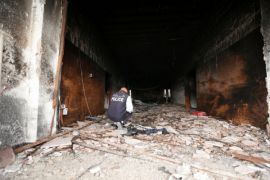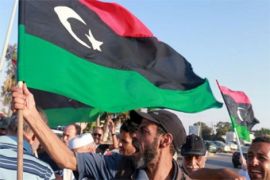"To underline our grave concern at the regime`s behaviour I can announce to the house that we have today taken steps to expel five diplomats at the Libyan embassy in London including the military attache," Hague told parliament.
"The government also judged that were these individuals to remain in Britain they could pose a threat to our security," he said.
A Foreign Office spokesman said the expelled diplomats were thought to be strong supporters of embattled Libyan leader Moamer Kadhafi, whom Britain and other countries have called on to stand down.
"We won`t go into details on their activities," the spokesman said.
"But we believe they are among the strongest Kadhafi supporters in the embassy, that they have put pressure on Libyan opposition and student groups in the UK and that there is a risk of damage to UK national security if they remain," he added.
Prime Minister David Cameron said earlier that he would not rule out arming rebels who are fighting Kadhafi`s regime.
There was no immediate reaction from the Libyan embassy in London.
Opposition protesters climbed on to the roof of the embassy -- officially known as the Libyan People`s Bureau -- on March 16 and replaced the Kadhafi regime`s flag with one used by Libyan rebels.
Britain, France and the United States have led an international coalition taking military action to enforce a UN resolution authorising "all necessary measures" including a no-fly zone to protect Libyan civilians.
Britain closed its embassy in Tripoli on February 26 after evacuating its staff from the country. It has since revoked Kadhafi`s head-of-state exemptions from British immigration controls.
Libya and Britain have a history of stormy diplomatic relations.
Britain severed all ties with the North African country in 1984 after a policewoman, Yvonne Fletcher, was shot dead while policing a peaceful demonstration outside the embassy in London.
The fatal shot was believed to have been fired from inside the building, sparking an 11-day stand-off with police, but the killer was presumed to have left Britain along with staff who later flew home under diplomatic immunity.
Libyan man Omar Ahmed Sodani, who is suspected of Fletcher`s killing has been captured by rebels in the eastern Libyan city of Benghazi but denies his involvement, British media said last week.
Relations further deteriorated after the 1988 bombing of a Pan-Am flight over the Scottish town of Lockerbie, for which a Libyan national was later convicted.
But after Libya accepted responsibility for Fletcher`s death and paid compensation to her family they restored diplomatic relations in 1999.
Former Prime Minister Tony Blair then helped lead Libya in from the international wilderness after Kadhafi agreed to give up weapons of destruction in 2003. (M014/K004)
Editor: Kunto Wibisono
Copyright © ANTARA 2011












